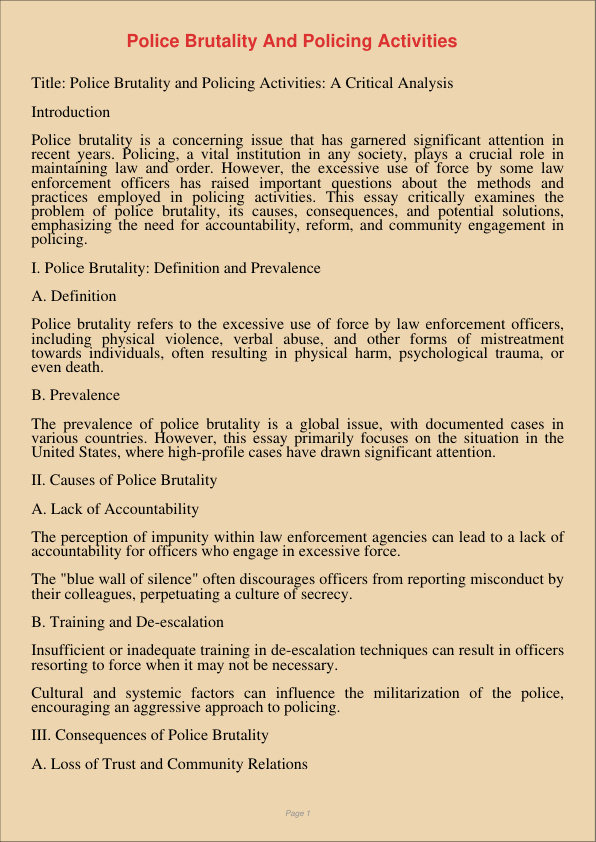Police Brutality And Policing Activities
Jan 8, 2024
policing activities
police brutality
Business
Literature
Title: Police Brutality and Policing Activities: A Critical Analysis
Introduction
Police brutality is a concerning issue that has garnered significant attention in recent years. Policing, a vital institution in any society, plays a crucial role in maintaining law and order. However, the excessive use of force by some law enforcement officers has raised important questions about the methods and practices employed in policing activities. This essay critically examines the problem of police brutality, its causes, consequences, and potential solutions, emphasizing the need for accountability, reform, and community engagement in policing.
I. Police Brutality: Definition and Prevalence
A. Definition
Police brutality refers to the excessive use of force by law enforcement officers, including physical violence, verbal abuse, and other forms of mistreatment towards individuals, often resulting in physical harm, psychological trauma, or even death.
B. Prevalence
The prevalence of police brutality is a global issue, with documented cases in various countries. However, this essay primarily focuses on the situation in the United States, where high-profile cases have drawn significant attention.
II. Causes of Police Brutality
A. Lack of Accountability
The perception of impunity within law enforcement agencies can lead to a lack of accountability for officers who engage in excessive force.
The “blue wall of silence” often discourages officers from reporting misconduct by their colleagues, perpetuating a culture of secrecy.
B. Training and De-escalation
Insufficient or inadequate training in de-escalation techniques can result in officers resorting to force when it may not be necessary.
Cultural and systemic factors can influence the militarization of the police, encouraging an aggressive approach to policing.
III. Consequences of Police Brutality
A. Loss of Trust and Community Relations
Police brutality erodes public trust in law enforcement agencies, leading to strained relationships between the police and the communities they serve.
Communities may become less likely to cooperate with the police, hindering crime prevention efforts.
B. Psychological and Physical Harm
Victims of police brutality often suffer from physical injuries, psychological trauma, and long-lasting emotional distress.
The negative impact is not limited to victims but extends to their families and communities.
IV. Solutions and Reforms
A. Accountability Measures
Implement independent oversight and review boards to investigate allegations of police misconduct.
Support the use of body-worn cameras to enhance transparency and accountability in policing activities.
B. Training and De-escalation
Prioritize comprehensive de-escalation training to equip officers with skills to defuse tense situations without excessive force.
Promote community policing to build positive relationships and understanding between officers and the communities they serve.
C. Policy and Legislative Reforms
Advocate for changes in use-of-force policies to emphasize non-lethal methods and limit the use of deadly force.
Support legislative reforms that address qualified immunity, which can shield officers from personal liability.
D. Community Engagement
Encourage community policing efforts that involve residents in decision-making and problem-solving within their neighborhoods.
Foster dialogue and mutual understanding between police departments and the communities they serve.
Conclusion
Addressing police brutality and improving policing activities is essential to restoring trust and harmony between law enforcement agencies and the communities they serve. By implementing accountability measures, providing proper training, enacting policy reforms, and emphasizing community engagement, it is possible to work toward a system of policing that prioritizes the protection and well-being of all individuals while upholding the principles of justice and the rule of law.
